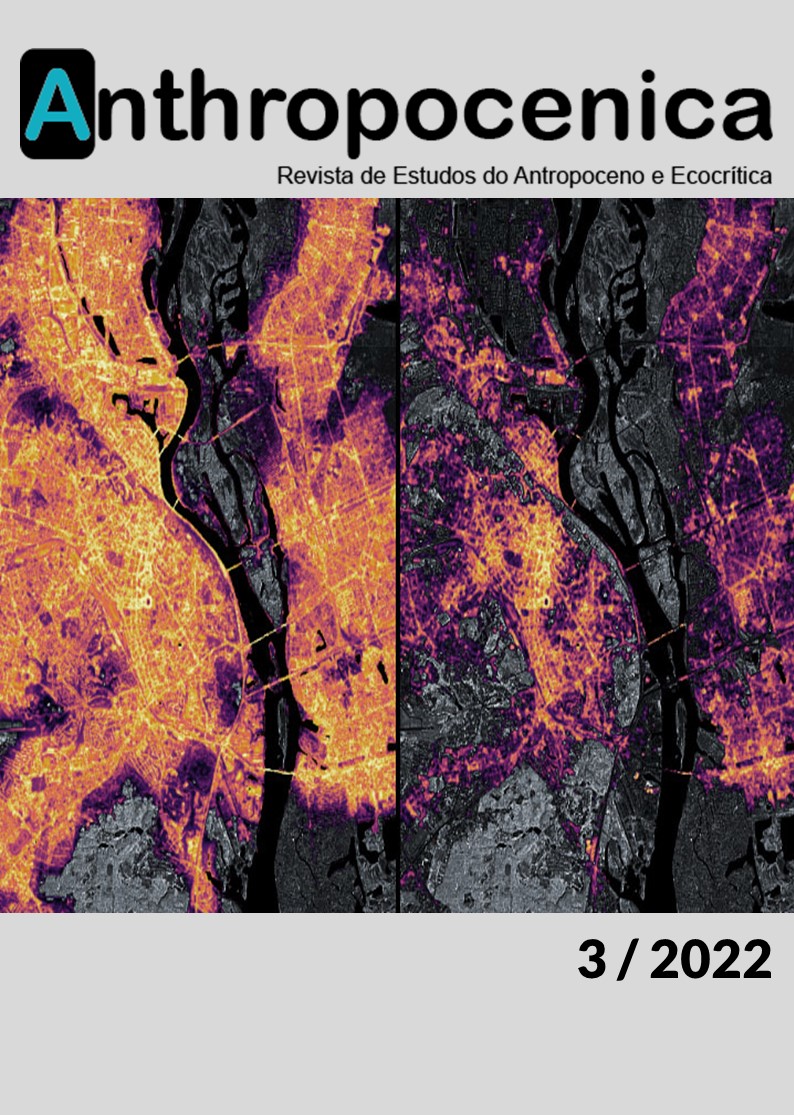Anthropocene, Technocene and the Problem of Philosophy of Education
DOI :
https://doi.org/10.21814/anthropocenica.4000Mots-clés :
Anthropocene – technology – philosophy of education – world – Fink – NietzscheRésumé
The term Anthropocene began to appear more often in scientific discourse more than 20 years ago. It was an attempt to come closer to understanding the depth and seriousness of the impact of man and his activities on the planet Earth, with the intention in the future to mitigate these effects and prevent a possible globally catastrophic environmental collapse, which might involve the collapse of civilization itself. However, to date, our approach to the world has hardly changed at all. After the pandemic comes the threat of a world conflict, a nuclear war. Since our scientific wisdom seems powerless, even the most obvious and frightening scientific knowledge cannot somehow change the course of global society, we want to think about this situation from the perspective of the cosmological philosophy of education. We want to think about this situation from the perspective of the cosmological philosophy of education. Its central motive is the philosophical disclosure of the original ontological ground of our humanity, which is the world, the cosmos. This is a direct confrontation with the hitherto prevailing “market education”, which serves to maintain and consolidate the power schemes of capital policy.
Téléchargements
Références
Bourdieu, P. (1979). Algeria 1960. Cambridge: Cambridge University Press.
Bourdieu, P. (1984). Distinction. London: Routledge.
Bourdieu, P. (1990). The Love of Art. Stanford: Stanford University Press.
Bourdieu, P, and Wacquant, L.J.D. (1992). An Invitation to Reflexive Sociology. Cambridge: Polity Press.
Bourdieu, P. (1994). Academic Discourse. Stanford: Stanford University Press.
Bourdieu, P. (2000). Pascalian Meditations. Cambridge: Polity Press.
Bourdieu, P. (1999). The Weight of the World. Cambridge: Polity Press.
Bowles, S. and Choi, J-K. (2019). The Neolithic Agricultural Revolution and the Origins of Private Property. Journal of Political Economy, 127(5): pp. 2186-2228. DOI: https://doi.org/10.1086/701789
Crutzen, P. and Stoermer, E. (2000). The ‘Anthropocene’. IGBP Newsletter, 41: pp. 17-18.
Dědečková, E. (2018). Kozmologická filozofia výchovy Eugena Finka [The Cosmological Philosophy of Education by Eugen Fink]. Praha: PedF UK.
Fink, E. (1974). Traktat über die Gewalt des Menschen. Frankfurt am Main: Vittorio Klostermann.
Fink, E. (1979). Nietzsches Philosophie, Stuttgart: Kohlhammer.
Fink, E. (1987). Existenz und Coexistenz. Grundprobleme der menschlichen Gemeinschaft. Franz-A. Schwarz (Eds.). Würzburg: Königshausen und Neumann.
Fink, E. (1992). Natur, Freiheit, Welt. Würzburg: Königshausen und Neumann.
Fink, E. (2003). Nietzsche’s Philosophy. Translated by G. Richter. London/New York: Continuum.
Fink, E. (2010). Spiel als Weltsymbol. In: Cathrin Nielsen and Hans Rainer Sepp (Eds.), Gesamtausgabe, vol. 7, Freiburg: Alber, 2010.
Fink, E. (2016). Play as Symbol of the World and Other Writings. Translated by Ian A. Moore and Christopher Turner. Bloomington/Indianapolis: Indiana University Press.
Gehlen, A. (2016). Urmensch und Spätkultur: Philosophische Ergebnisse und Aussagen. Frankfurt am Main: Vittorio Klostermann. DOI: https://doi.org/10.5771/9783465142720
Charlesworth, S. (1999). A Phenomenology of Working Class Experience. Cambridge: Cambridge University Press. DOI: https://doi.org/10.1017/CBO9780511489419
Charlesworth, S. (2019). The Truth is Out There: ‘Educated fo’ Bollocks. Uni’s Just Institutional Daylight Robbery’. Universities in Crisis? What’s New? In: Leonidas Donskis, Ida Sabelis, Frans Kamsteeg and Harry Wels (Eds.), Academia in crisis, pp. 169-194. Leiden: Brill. DOI: https://doi.org/10.1163/9789004402034_010
Kaplan, M. (2021, December 22). After death threats, Dr. Alina Chan doubles down onn COVID-19 origin theory. New York Post. https://nypost.com/2021/12/22/dr-alina-chan-doubles-down-on-covid-19-origin-theory/.
Lumila, M. (2020). Technische Bildung als eine weltoffene und für die Bildungstheorie angemessene Konzeption bei Eugen Fink. In: Naděžda Pelcová and Lea Květoňová (Eds.), Existence a koexistence ve filosofické, speciálněpedagogické a psychologické reflexi. Inkulzivní škola [Existence and coexistence in philosophical, specialpedagogical and psychological reflection. Inculsive school], pp. 101-118. Prague: Charles University, Faculty of Education. Available also online: https://www.academia.edu/43326545/_Technische_Bildung_als_eine_weltoffene_und_f%C3%BCr_die_Bildungstheorie_angemessene_Konzeption_bei_Eugen_Fink.
Mendes, J. (2021). Does the Sustainability of the Anthropocene Technosphere Imply an Existential Risk for Our Species? Thinking with Peter Haff. Social Sciences, 10(8): pp. 1-14. DOI: 10.3390/socsci10080314. DOI: https://doi.org/10.3390/socsci10080314
Nietzsche, F. (1988a). Unzeitgemässe Betrachtungen. In: G. Colli and M. Montinari (Eds.), Kritische Studienausgabe 1. Berlin: De Gruyter.
Nietzsche, F. (1988b). Also sprach Zarathustra. In: G. Colli and M. Montinari (Eds.), Kritische Studienausgabe 4. Berlin: De Gruyter. DOI: https://doi.org/10.1515/9783112418802
Nietzsche, F. (1988c). Nachgelassene Fragmente 1875-1879. In: G. Colli and M. Montinari (Eds.), Kritische Studienausgabe 8. Berlin: De Gruyter. DOI: https://doi.org/10.1515/9783110860986
Nietzsche, F. (1988d). Nachgelassene Fragmente 1885-1887. In: G. Colli and M. Montinari (Eds.), Kritische Studienausgabe 12. Berlin: De Gruyter. DOI: https://doi.org/10.1515/9783112419045




